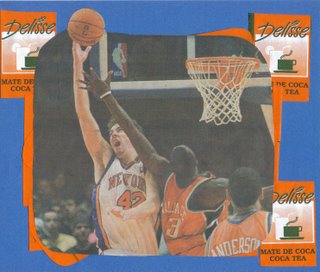Roger Federer Wins The Australian Open

On Sunday at around 5:30 AM eastern standard time, Roger Federer capped what was arguably his best tournament effort to date by beating Fernando Gonzalez in straight sets, 7-6 (2), 6-4, 6-4 to win the 2007 Australian Open in Melbourne. "Speedy" Gonzalez, a lively Chilean who until recently had been known more for on-court emotional display than for his tennis, surprised the field with his outstanding play, beating four top 20 players, including Lleyton Hewitt, James Blake, and Raphael Nadal, en route to the final match.
But "outstanding" hardly captures the level of play that Federer sustained over the two weeks of the tournament. Federer demands new levels of hyperbole from sportswriters attempting to describe his superlative play. When he served an ace to close out the final match, he had them running for their thesauruses once again. Luckily for Roger Federer, the vocabulary of his tennis game is prodigious, and with that final ace as exclamation point, he authored maybe the greatest performance of all time in Melbourne. He dropped not a single set in seven matches there. He even fought off a double set point in the first set of the championship, battling back to break Gonzalez's serve, ultimately taking the set in a decisive tie-break. It was as close as Gonzalez would come to hanging with the world's top player. No player since Bjorn Borg in the 1980 French Open had won a major without dropping a set.
Federer, 25, secured his 10th major open championship, drawing one closer to Pete Sampras' open-era record of 14. Sampras was 31 when he won his last major championship, the 2002 U.S. Open. Federer could reach 14 as early as next season's Australian Open. The final in Melbourne on Sunday was also the Swiss's career-best 36th consecutive match win.
The statistics show that Roger Federer has, at a relatively tender age, become one of the greatest tennis players of all time (as mentioned above, verbal descriptions of his game often fall short.) Like Tiger Woods, he is on pace to shatter all relevant records relating to tournament success in his sport. Woods and Federer have struck up a much publicized friendship, no doubt cemented by their mutual understanding of peerless excellence in individual sports (Woods, meanwhile, won the Buick Open on Sunday, his sventh straight tournament victory.)
Federer's sublime performance in Melbourne was best exemplified by his complete destruction of the top U.S. player, Andy Roddick, 6-4, 6-0, 6-2, in the semi-finals. Federer showcased his usual barrage of brilliant shots from all over the court. At one point, a frustrated Roddick placed the butt-end of his racket to his head and pantomimed his own execution. Federer possesses a Euclidian understanding of lines and angles to complement his bedrock mastery of the basics--forehand, backhand, offense, defense, side to side. But it was his extraordinary vision on display when he successfuly challenged no less than three of the umpire's calls in the Roddick match. Federer had described the new challenge system implemented at the Aussie Open as "nonsense", feeling that it took too much pressure off of the umpire and linespeople. "I don't want to have to call my own lines," he said. Ironically, he ended up doing just that: his challenges were all upheld, proving that in each instance the official call was erroneous (the system employs a virtual replay in which the path of the ball is tracked to the exact spot where it met the surface of the court.) Federer won another couple of challenges in the final against Gonzalez, including one shot, a cross-court backhand from deep in his own end, officially ruled out, where the virtual replay showed the ball to have caught the smallest sliver of the line. Federer's eyesight is clearly as good as his game, and both are as close to perfection as tennis has ever seen.
Federer's win down under sets the stage for an intriguing French Open, the next major tounament of the season, which starts on May 27 in Paris. Federer has never won the championship on the slow-playing red clay of Stade Roland Garros. His clay court nemisis, the left-handed Spaniard Raphael Nadal, ranked number 2 in the world, has bounced him from the last two French Opens, most notably in last year's final match. If Federer can maintain his current, unprecedented level of dominance over the rest of the field, if he can survive the beguiling clay and the wily Spaniard who has bested him there, if he succeeds and hoists the trophy at the French Open, he will move one step closer to completing that most elusive of tennis achievements, the Grand Slam--all four major championships in the same calendar year. This feat has not been accomplished by a man since the great Aussie Rod Laver did it in 1969. Regardless of Federer's performance at Wimbledon and the U.S. Open thereafter, if he can win the French, he will join an almost-as-exclusive club of just five men who have won all four majors in their career, a club that includes Laver and Andre Agassi.
Stay tuned; it should be a thrilling summer for the tennis fan.

